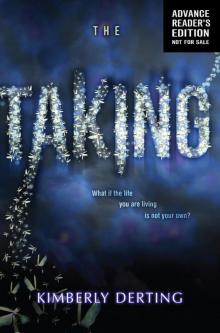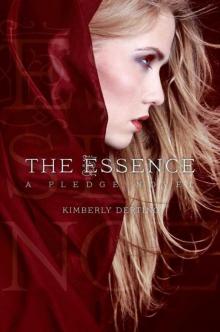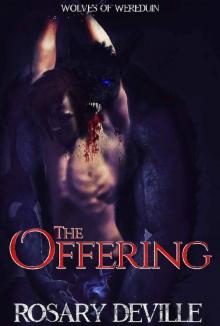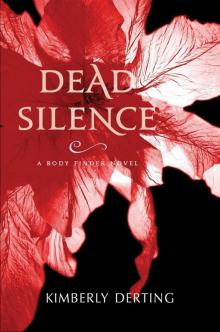- Home
- Kimberly Derting
The Pledge Page 2
The Pledge Read online
Page 2
When Brooklynn arrived, she dropped her bag at Aron’s feet. As usual, she didn’t say “Good morning” or “Would you please?” but Aron reached for her bag anyway.
Unlike his father, there wasn’t an unkind bone in Aron’s body. Or maybe “stupid” was the word I sought to describe the elder Grayson. Or rude. Or lazy. It didn’t matter; any of those unflattering traits that his father possessed had apparently bypassed his son.
“What? You didn’t bring me anything?” She jutted her full lower lip in a pout, and her dark eyes flashed enviously as she eyed the silk in my hands.
“Sorry, Brook, my dad would notice if I snagged too much at once. Maybe next time.”
“Yeah, right, Midget. You say that now, but next time it’ll be for Charlie too.”
I smiled at Brook’s nickname for Aron. He was taller than Brooklynn now, taller than both of us, yet she still insisted on calling him Midget.
I slipped the delicate fabric into my bag with great care, wondering what, exactly, I would make from it, already anxious to put needle and thread to it.
Brook led the way as we moved around the perimeter of the plaza, where the crowds were already gathering. As always, we took the long way, avoiding the central square. I’d like to think that it was Brook’s or even Aron’s idea—or that either of them was as disturbed by the things that happened in the square as I was—but I doubted that was true. I knew it bothered me more.
From somewhere overhead, another message crackled: “ALL SUSPICIOUS ACTIVITY MUST BE REPORTED TO YOUR NEAREST PATROL STATION.”
“Passports,” Aron announced solemnly as we approached a new checkpoint at the base of the giant archway that led to the city streets. He reached beneath his shirt, just as Brook and I did, pulling out our IDs.
There were more and more of the checkpoints lately, with new ones appearing overnight. This one was no different from most: four armed soldiers, two for each line—one for the men and one for the women and children. After the photo on each Passport was visually matched to the person wearing it, the identification card was scanned through a portable electronic device.
The checkpoints didn’t matter, really; they weren’t meant for us. We weren’t the revolutionaries they sought to keep from moving freely about the city. To Brook and Aron and me, they were simply another security measure, one of the consequences of the war brewing within the borders of our own country.
And if you asked Brooklynn, the checkpoints were a bonus, new opportunities to practice her flirting techniques.
Brook and I stood in our line, remaining silent as we awaited our turn. While our Passports were being scanned into the system and we waited to be cleared, I stood back and watched as Brook batted her t Bas Bted her hick black lashes at the young soldier holding her card.
He glanced down at the scanner, and then back to her again, and the corner of his mouth rose subtly, almost unnoticeably. Brook stepped closer than she needed to when the light on the portable computer flashed green, clearing her.
“Thank you,” she purred as she held his gaze, her voice low and husky. She slipped the Passport down the front of her shirt, making sure he watched it fall.
The IDs weren’t anything new to us. They’d been issued for as far back as anyone could remember. But it was only in the last few years that we’d been forced to start wearing them in order to be “tracked,” so that the queen and her officials knew where we were at all times. Just another reminder that the revolutionaries were tightening their stranglehold on the crown.
I’d once seen someone taken into custody at one of the checkpoints, a woman who had tried to slip through using another person’s Passport. She’d passed the visual inspection, but when the card was scanned, the little light on the machine flashed red instead of green. The Passport had been reported stolen.
The queen had no tolerance for crime. Theft was treated just as severely as treason or murder would be: All were punishable by death.
“Charlie!” Aron’s voice dragged me out of my own thoughts. I hurried after them, not wanting to be late for school, as I tucked my Passport back inside the front of my dress and ran to catch up. As I reached them, a loud cheer went up behind us—coming from the crowded square we’d just left behind.
None of us flinched or even faltered in our steps. Not one of us so much as blinked to acknowledge that we’d even heard the sound, not when we were so near the guards at the checkpoint who were always watching.
I thought briefly of the woman I’d seen that day, the one with the stolen Passport, and I wondered what it had been like for her, standing on the gallows in the square surrounded by a crowd of onlookers. People who jeered at her for the crime she’d committed. I wondered if her family had come to watch, if they’d seen the trapdoor drop open beneath her feet. If they’d closed their eyes when the rope had snapped her neck, if they’d wept while her feet swayed lifelessly beneath her.
Then the voice from the loudspeaker reminded us: “A DILIGENT CITIZEN IS A HAPPY CITIZEN.”
Inside, my heart ached.
“Did you hear that the villages along the southern borders are all under siege?” Brooklynn asked once we were past the soldiers at the checkpoint and on the less-crowded city streets, away from the marketplace.
I rolled my eyes at Aron. We already knew that towns along the border were under attack; they’d been under attack for months. Everyone knew. That was part of the reason our city was suddenly so overpopulated by refugees. Almost everyone had taken in stray family members and their servants.
As far as I knew, mine was one of the few families unaffected by the migration, but only because we didn’t have any relatives in the outlying areas of the country.
“I wonder how long until the violence reaches the Capitol,” Brook continued dramatically. Binueically.
“Queen Sabara will never let them reach us. She’ll send her own army before they get too close,” I argued.
It was laughable calling our city “the Capitol,” since its concrete walls housed no one who held any real sway. The term implied authority and influence, when in reality we were simply the closest city to the palace. The queen was still the only person who held any true power.
But at least our city had a name.
Most of the cities of Ludania had long ago been stripped of that privilege, having been renamed simply by the quadrant of the country in which they were located and then ranked by size. 1West, 4South, 2East.
Children were often named in remembrance of the old cities. Once, it had been a form of rebellion to name a new baby Carlton or Lewis or Lincoln, a way of expressing dissatisfaction with the crown’s decision to reclassify cities into statistics. But now it was merely tradition, and babies were named after cities from countries across the globe.
People often assumed that my real name was Charlotte, after a faraway, long-ago city. But my parents claimed that they refused to partake in anything that would be considered rebellious, even a long-accepted custom like naming.
They preferred not to draw attention.
Brooklynn, on the other hand, liked to brag about her name’s roots. A great borough, in an even greater city that no longer existed.
She leaned in, her eyes feverishly bright. “Well, I heard . . .” She let those three words hang in the air, assuring us that she had information we didn’t. “. . . that the queen’s army is gathering in the east. Rumor has it that Queen Elena plans to join forces with the rebels.”
“Who told you that? One of your soldiers?” I whispered, so close now that my forehead practically touched hers as I searched her eyes probingly. I didn’t actually doubt her. Brook’s intelligence was rarely wrong. “How do you know they’re telling you the truth?”
Brook grinned, a slow, shameless grin. “Look at me, Charlie. Why would they lie to me?” And then she added, more seriously, “They say the queen’s getting tired. That she’ll be too old to fight back much longer.”
“That’s a bunch of crap, Brook. Old or not, Queen Saba
ra will never give up her country.” It was one thing to share real news from the front; it was another entirely to spread lies about our queen.
“What choice does she have?” Brook shrugged, continuing. “There’s no princess to take her place, and she certainly won’t allow a male heir to inherit the throne. It hasn’t been done in almost four hundred years; she’s not about to let it happen now. She’ll renounce the royal line before she allows the country to have a reigning king again.”
As we approached the Academy, I could feel my stomach tightening into angry knots. “That’s true, I suppose,” I said distractedly, no longer interested in a political debate. “She probably won’t allow herself to die until she finds a suitable female heir.”
I wished I could remain calm in the Bld rlm in th presence of the imposing school, impervious and unaffected. Above all, I desperately didn’t want the Counsel kids to see my discomfort.
Everything about the upscale school, including the students’ immaculately matched uniforms, screamed, We’re better than you. Even the white marble steps that led to the grand entrance of the Academy were polished to a high shine, making them look as if they’d be treacherous to maneuver.
I hated myself for wishing I knew the sound my shoes would make walking up them.
I tried not to look in the direction of the Academy students who loitered near the top of those steps. For some reason these particular girls bothered me most of all; these two who watched us more closely than the others, who enjoyed taunting us when we walked by.
Today was no different. The skirts of their identical uniforms were creased, and their snowy white shirts were starched and pristine. These girls most definitely knew the feeling of silk.
I tried not to notice as one of the girls moved purposefully down the last steps, her eyes targeting us. She flipped her golden-blond hair over her shoulder; her cheeks were flushed and rosy; her eyes glittered with malice.
She stopped on the sidewalk in front of us, holding up her hand, signaling that we should stay where we were. “Where are you three off to in such a hurry?” she intentionally asked in Termani, aware that we weren’t permitted to understand her.
Her words made the air vibrate around me, making it hard for me to breathe. I knew what I was supposed to do. Everyone knew. Beside me, Aron’s gaze shot to his feet, and Brooklynn’s did the same. A part of me wanted to ignore logic—to ignore the law—and my jaw clenched in response to her caustic words. But I knew that I wouldn’t. It wasn’t just my fate that I tempted if I broke the law—Brook and Aron might be held responsible as well.
I dropped my head and tried to ignore the prickling on my arms as I felt the girl’s eyes drilling into me.
Her friend stood beside her now, the two of them forming a wall in front of us. “I don’t know why they even let vendors go to school at all, do you, Sydney?”
And, again, the air shivered in hot waves.
“Don’t be ridiculous, Veronica, they have to go to school. How else are they going to learn to count our change when they work for us? I mean, just look at their hands. They’re already working somewhere, and they probably have no idea how to count or read or even how to write.”
I hated them both for thinking we were ignorant, and my teeth ached from biting back my retorts. But my cheeks burned as I stole a quick glance at Sydney’s perfectly manicured hands. She was right about that part; my nails were short and my skin raw from washing dishes in my parents’ restaurant. I wanted desperately to hide them behind my back, but I couldn’t risk letting her know I’d understood her insults.
Keeping my gaze averted, I tried to sidestep her, but she matched my stride, moving with me and keeping herself in my path. Blood pulsed in my ears.
“Don’t go yet,” she cooed. “We’re just starting B217;startingto have fun. Aren’t you having fun, Veronica?”
There was a wooden pause, and then her friend answered, her voice apathetic. “Not really, Syd. I’m going back inside. They’re not really worth it.”
Sydney waited only a few seconds longer, still blocking our way, before she finally grew bored and left us standing there so she could follow her friend back up the polished marble steps. I didn’t lift my head until I heard the doors of the Academy close behind them.
And then I exhaled loudly.
“Why do they do that?” Brook asked, once we were away from the gleaming school. Her cheeks were red, and her eyes glistened with unshed tears. She reached over, her fingers closing around my hand. “What did we ever do to them?”
Aron seemed just as shaken. “I wonder what it is that they’re saying about us, when they do that.” His voice was ragged, and he shook his head wearily.
I just shrugged. It was all I could do. I could never tell them the truth of what Sydney and her friend had said.
We reached our school, which was far less grand and polished than the Academy. The building was old brick, not the eye-catching kind of brick found on historical buildings with charm, but rather the crumbling kind that looked like it might cave in on itself at any moment. We didn’t have fancy uniforms or even a name, like the Academy; we were merely known as School 33.
But it was hard to complain. It was a school, and we were allowed to attend. And it was still open, despite the fighting going on within our country. These were all things to be grateful for. There were worse things in life than attending a Vendor’s school.
Like attending no school at all.
The morning bell sounded, and everyone in the classroom stood, as did every other student at every other school throughout the country. In unison, we raised our right hands, our elbows bent, our fists raised skyward, and for the only time during school hours, we spoke in Englaise.
It was the Queen’s Pledge:
My breath is my pledge to worship my queen
above all others.
My breath is my pledge to obey the laws of my
country.
My breath is my pledge to respect my superiors.
My breath is my pledge to contribute to the
progress of my class.
My breath is my pledge to report all who would
do harm to my queen and country.
As I breathe, I pledge.
I didn’t often listen to the words of the Pledge. I just spoke them, letting them fall negligently from my lips. After years of repetition, they’d become second nature, almost exactly like breathing.
But today, maybe for the first time ever, I heard them. I noted the words we emphasized: worship, obey, respect, contribute, report. I listed the order of importan Bthe importace in my head: queen, then country, then class. The Pledge was a command as much as it was a promise, yet another way that the queen demanded that we protect her and our way of life.
I looked at the kids around me, my classmates. I saw clothing in shades of grays, blues, browns, and blacks. Working-class colors. Practical colors. The fabrics and textures were sensible—cottons, wools, even canvas—durable and hard to soil. I didn’t even have to look to know that every student in the classroom stood erect, chins high. That was something our parents and teachers instilled in us each and every day, to be proud of who we were.
I wondered why we had been born of the Vendor class. Why we were better than some, yet not as good as others. But I knew the answer: It had nothing to do with us. It was simple fate.
Had we been born to parents of the Serving class, we would not be attending classes today. And had our parents been Counsel folk, we would have climbed the gleaming steps to the Academy.
The instructor cleared his throat and I jumped, realizing that the Pledge was over, and that my fist—and mine alone—was still raised.
My face burned hot beneath the stares of the forty-five merchant-born children who shared this hour with me as I dropped my fist to my side, clenching it tightly as I took my seat. Beside me, I saw Brooklynn grinning.
I glared at her, but she knew it wasn’t a real glare, and it only made her smile grow.
“You heard, didn’t you?” Aron spoke in a low whisper when I joined him in the courtyard for the lunch hour. Other than during the Pledge, Parshon was the only language we were permitted to speak in our school.
Aron didn’t need to elaborate. Of course I’d already heard the latest gossip. I dropped my voice too, as I scooted closer to him on the stone bench. “Do you know if they got her whole family? Did they take her parents and her brothers and sisters?”
Brook joined us then and immediately recognized the hushed tone and the way our eyes darted nervously, watching everyone and trusting no one. “Cheyenne?” she asked in a half whisper.
I reached into my book bag and handed Brook the lunch my mother had prepared for her, just as she had every day since Brook’s own mother had died.
She sat down on the other side of Aron, our three heads ducking close.
Aron nodded, his eyes meeting first mine and then hers. “I heard they came in during the night and took only her. She’s being held at the palace for questioning, but it doesn’t look good. Word is, there was real evidence this time.”
We stopped speaking, sitting straighter as the young boy made his way across the grass, gathering garbage along the way. He didn’t talk to anyone, just moved slowly, methodically, minding his step. As a member of the Serving class he had only one language, Englaise. So within the walls of our school—except during the Pledge—he wasn’t permitted to speak. He simply stared downward as he gathered refuse.
He was scarcely older than Angelina—six, maybe seven B2;si sevenÔwith unruly black hair and calluses on his dirty bare feet. With his head down, I couldn’t see the color of his eyes.
He paused beside us, waiting to see if we had any trash he could collect. Instead, I reached into my own lunch and palmed a cookie my mother had baked. I held it out to him, making certain that no one else could see it in my hand. I raised my eyes, hoping he might lift his, but he never did.

 Skin Contact
Skin Contact The Taking
The Taking The Replaced
The Replaced The Body Finder
The Body Finder Desires of the Dead
Desires of the Dead Unbound
Unbound The Essence
The Essence The Last Echo
The Last Echo Unbound (The Men of West Beach Book 2)
Unbound (The Men of West Beach Book 2) The Offering
The Offering Undressed
Undressed Dead Silence
Dead Silence The Last Echo: A Body Finder Novel
The Last Echo: A Body Finder Novel Skin Contact (Body Finder)
Skin Contact (Body Finder)